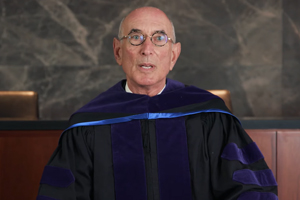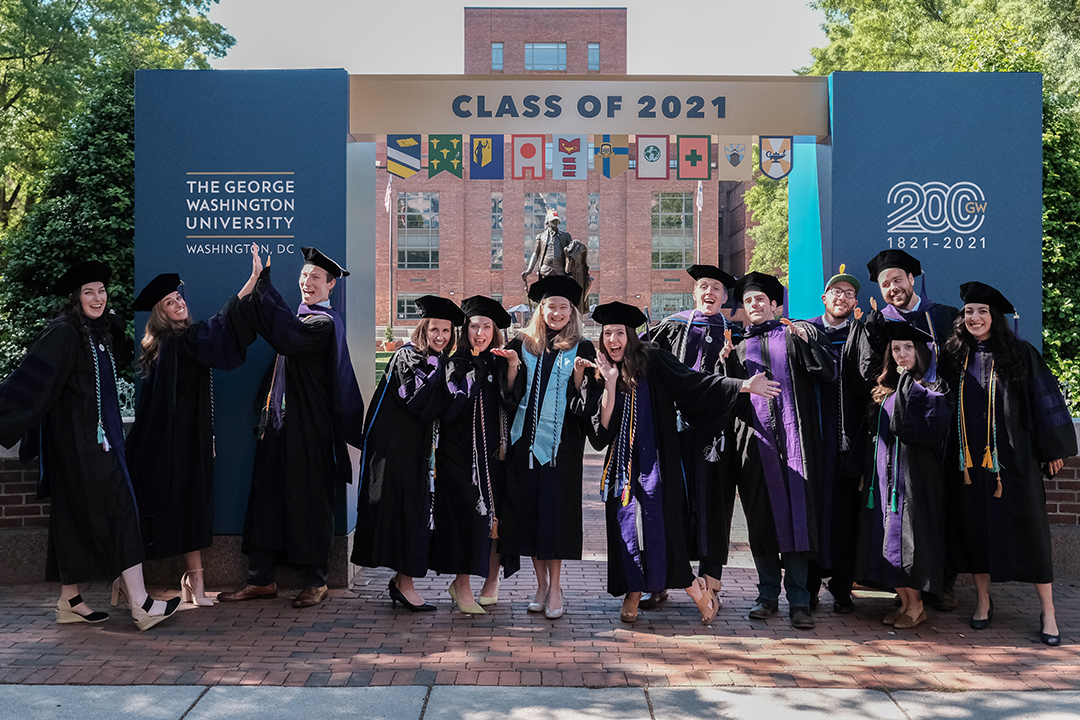The 154th Commencement of the George Washington University Law School was held on Sunday, May 16, 2021. Virtual events took place throughout the weekend and included the Pro Bono Recognition Celebration, Academic Awards Ceremony, the University Commencement, and the GW Law Diploma Ceremony.
GW Law’s virtual Law School Diploma Ceremony honored the class of 2021 following a year of unprecedented challenge. Jeffrey and Martha Kohn Senior Associate Dean for Academic Affairs Emily Hammond announced the commencement. In her first commencement at GW Law, Dean Dayna Bowen Matthew gave a virtual welcome address to family members, friends, and members of the law school community, and led the audience in a moment of silence in memory of third-year student Anil Taibjee, who passed away last month.
Jacqueline Fisher, President of the GW Law Student Bar Association, addressed her fellow graduates and presented five awards to faculty and staff as voted on by the graduating class. The Distinguished Staff Member Award was received by Bobby Walis. Annie Abrams, a member of the class of 2021, was honored with the Distinguished Service Award. Senior Associate Dean Emily Hammond received the Distinguished Associate/Assistant Dean Award. The Michael D. Cooley Memorial Award was presented to graduate Jessica Sullivan. The Distinguished Faculty Service Award was received by Professor Sonia M. Suter. Dean Matthew presented the Distinguished Adjunct Faculty Teaching Award to Professorial Lecturer in Law Patrice A. Sulton.
More than a dozen of GW Law's faculty and members of the administration offered congratulations, advice, and well wishes, in a "last lecture" for the graduates.

Michael Hausfeld, JD ’69, the Chairman and Founder of Hausfeld LLP, delivered the keynote address, emphasizing a core principle of the law and those who practice it - the role of the law as guardian of human dignity and equality. A groundbreaking human rights lawyer and one of the top civil litigators in the United States, he shared snapshots of his experiences in advocating for environmental justice, gender justice, racial justice, and climate justice.
During his long and distinguished legal career, Mr. Hausfeld recounted successfully representing Native Alaskans facing environmental threats to their way of life following the Exxon Valdez oil spill in 1989. As one of the first lawyers in the United States to declare sexual harassment a form of discrimination prohibited by Title VII of the Civil Rights Act, he also tried the first case establishing that principle when he represented a Department of Justice employee who was fired for her refusal to have sex with a supervisor.
Mr. Hausfeld told the story of a group of African American childhood survivors, who successfully sued for damages and in the process helped to rewrite history, many years after the Tulsa Massacre of 1921, the single worst episode of racially motivated mass murder in the nation’s history. In addition, he represented Holocaust victims who sought legal accountability for the atrocities they endured. These survivors ultimately received a public apology from the German government and established the first-ever multi-billion dollar compensation fund for victims of forced labor. He then described working with 12 young climate activists, including Greta Thunberg, who filed a petition with the United Nations claiming that the current climate crisis is a human rights violation with children in the forefront. The outcome of the case remains undecided.
Mr. Hausfeld told members of the graduating class, “Protecting and respecting human rights is not the product of chance. It must be vigilantly pursued. You will win some and likely lose more. But you should never stop. The law may be slow to bring about change but you must challenge it when there is a need to do so.”
He continued, “As you begin your careers, you will find that you will not only be practicing law, but you may also have the opportunity to write it, enforce it, or interpret it. Regardless of which you choose to do, please remember you have the skill, knowledge, and power to shape it for the better.”
Mr. Hausfeld also shared the following advice, “Let your heart be your conscience in guiding your power. Let your mind be your caution in exercising that power. Do not accept what is without exploring what you believe should or could be. Speak for those whose voices are not heard. Show the faces of those who are not seen. Pursue through the law those self-evident, inalienable rights of all people in all places at all times to reach that dream of a more just world.”
Dean Matthew then recognized the graduating class, and each member’s name scrolled across the screen, beginning with more than 550 JD graduates. The recipient of the John Bell Larner Award, Geoffrey Comber, was listed first for the highest cumulative average in the JD graduating class. Ellen Albritton, the recipient of the Anne Wells Branscomb Award for the highest cumulative average in the part-time program, followed. The names of the 58 LLM graduates were then displayed, and finally the nine MSL graduates.
Learn more about the class of 2021 in the virtual graduate yearbook, where each graduate is highlighted digitally with an individual profile, including a photo and quote or memory.


